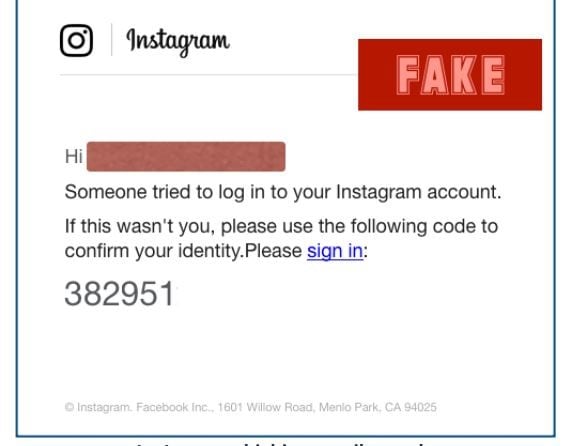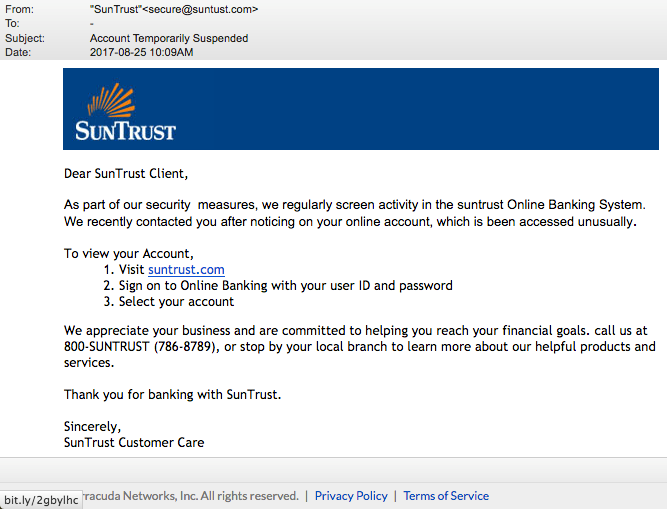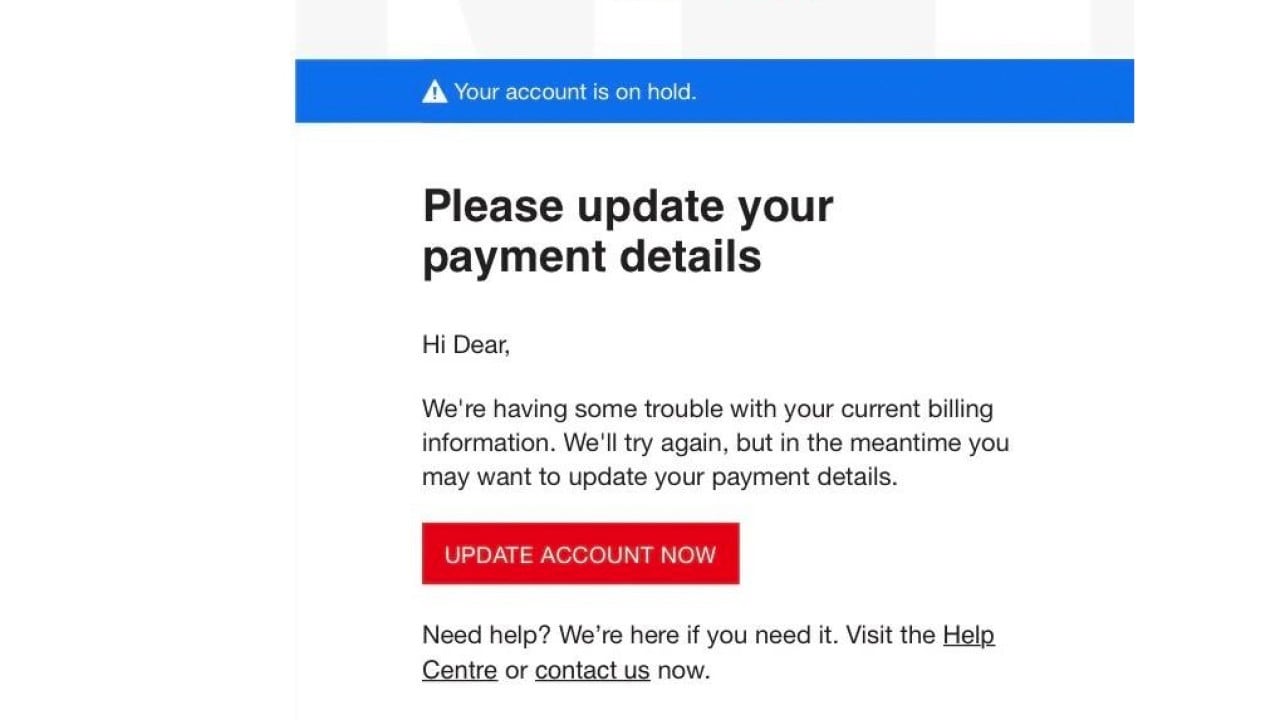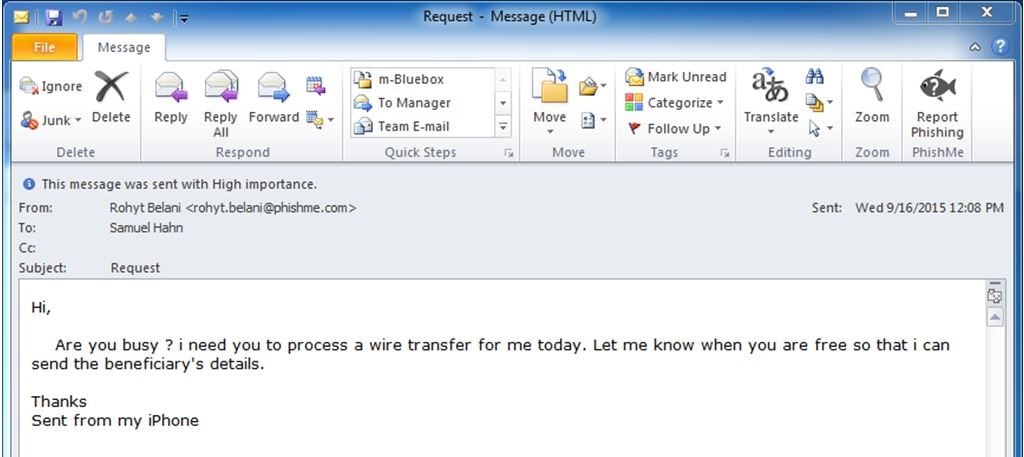Is Itunes Email Asking For Money A Virus

January. 10, 2020

Attempt Norton 360FREE 30-Day Trial* - Includes Norton Secure VPN
30 days of Complimentary* comprehensive antivirus, device security and online privacy with Norton Secure VPN.
Join today. Abolish anytime.
*Terms Apply

E'er become an email message from your bank warning you that your savings and checking accounts accept been locked considering of suspicious withdrawals? That electronic mail might ask you to click on a link embedded in the message to verify your identity and keep your account open.
Don't fall for this scam. The odds are that the email is an example of phishing, an endeavor by scammers to trick you lot into providing personal or financial information that they can then employ to steal money from your bank accounts, make fraudulent purchases with your credit cards, or accept out loans in your name.
If yous practice click on a link in a phishing email, y'all'll normally be taken to a new web page that looks like it belongs to your depository financial institution or credit card company or even PayPal. That folio will enquire you for your personal and financial information — maybe your account numbers or log in credentials, like your username and password. One time the scammer behind this bogus page gets that sensitive information, they can easily access your fiscal accounts.
Phishing is a grade of social engineering science — phishers pose as a trusted system to pull a fast one on you into providing information. Phishing attacks are showing no signs of slowing. But if you're careful, you can avoid falling victim to them. Remember, your banking concern or credit card provider will never ask you lot to provide business relationship information online. When emails ask for this information, that's the first sign that they're scams.
Cheque the links that these emails ask yous to click, besides. If you hover over them, you lot'll see their true addresses. They're usually not affiliated with the depository financial institution or credit card provider they are spoofing.
Fortunately, there are unremarkably other telltale signs that an electronic mail is phishing for your personal information. Below are examples of contempo phishing emails. We've analyzed these emails so you'll know what to wait for when determining whether an e-mail is legitimate or a scam. And that can help you heave your cybersecurity.
Recognizing phishing email scams
What are some general clues that an email isn't legitimate but is instead a phishing email?
Grammatical errors
Many phishing emails are filled with grammatical errors, odd capitalization, and misspellings. The emails might as well contain odd phrases or sentences that sound a bit off. Read your electronic mail aloud. If something doesn't sound right, or professional person, be suspicious. Information technology could exist a phishing assault.
Low-resolution logo
Phishers will often cut and paste the logos of regime agencies, banks and credit bill of fare providers in their phishing emails. If the logo is of low quality — it's fuzzy, indistinct, or tiny — this is a sign that the person contacting you lot doesn't really work for that company.
Odd URL
One of the easiest means to tell if an email is a scam? Hover over whatever link the message is asking you to click. This volition show the link's URL. Often, you'll see that the URL doesn't vest to whatever company is supposedly sending you the message.
Over again, this is a sign that a scammer is trying to trick you. Merely be careful when hovering. You don't want to accidentally click on the link.
Here are some phishing examples to consider.
Phishing email instance: Instagram two-factor authentication scam

Two-cistron hallmark, or 2FA, is one of the best ways to protect your personal or fiscal data. When you log onto a site — say your online bank or credit carte du jour provider — y'all'll have to provide your username and password as usual. If yous accept two-factor authentication enabled, the site will then send a text or email to yous with a code. You must enter that code before yous can complete your log in to the site.
Scammers, though, are now using this extra security mensurate as a way to trick y'all. A new phishing campaign is targeting Instagram users, sending them emails claiming that someone has tried to log into their Instagram accounts.
The electronic mail asks recipients to sign into a site that is supposedly run past Instagram, a social media service. Information technology'southward non, of course. Merely what'due south interesting is that the scammers include a code at the lesser of the message, implying that users should type that lawmaking in — as if it was an example of two-gene authentication — when they sign into the spoofed web folio.
How can you tell it'due south false?
This is a well-done scam. In that location is i tell-tale sign that the email is simulated, though. If you lot click on the link and access the spoofed website, the domain proper name displayed in your browser'south accost bar will be .CF. That is a country lawmaking for the Key African Commonwealth. That's why information technology's smart not to click. Instead, hover over the link to see the true accost.
Phishing email example: Account temporarily suspended

Yous might receive a discover from your bank — or another banking concern that you don't even practise business with — stating that your account has been temporarily suspended. Why? Co-ordinate to the e-mail, your bank has discovered unusual activeness on your account and has decided to shut it downwardly to protect y'all.
The email volition then ask you to click on a link to reactivate your business relationship. This link will take you lot to a faux folio that asks for your user ID and countersign.
This, of course, is fake. When you enter your business relationship information, y'all'll be giving it directly to a scammer.
How tin you tell it'due south fake?
There are usually several clues that such emails are fake. Beginning, look for spelling or grammatical errors. In the example to a higher place, supposedly sent by SunTrust, you'll run into that the sentence "We recently contacted you later on noticing on your online account, which is been accessed unusually" doesn't really make any sense.
If you hovered over the Suntrust.com link in the live version of the paradigm in a higher place, you'd encounter a link to a shortened URL at chip.ly. If you unshorten that link, yous'll discover that information technology leads to a pet-food company in Israel, not to SunTrust.
Phishing email example: Tax refund scam

Getting an unexpected windfall of greenbacks? Who wouldn't want that? Be careful, though: If someone sends you an e-mail saying that y'all're due a refund or greenbacks prize of some sort, it's usually a scam. Consider a common version of this, the IRS refund phishing attempt.
You might receive an email that looks like it comes from the IRS. The headline volition hope that you are owed a refund from the agency and that y'all tin claim it online. The body of the bulletin will usually state that the IRS made an error in computing your taxation bill, and now owes you money, perchance hundreds of dollars.
When you click on the link included in the e-mail to claim the alleged refund, you lot'll either meet a spoof site designed to trick you into giving up personal and financial information or your computer or device could be exposed to malware.
How tin you tell it's fake?
In that location are clues to alarm you that this bulletin is fake. The biggest, though, is the message itself. The IRS will never email you to ask for your personal information. If yous get a bulletin saying that the IRS owes you money, call the government agency yourself to check. The odds are loftier that the IRS doesn't owe y'all anything and that a scammer sent you the bulletin.
Phishing electronic mail example: Netflix phishing scam

Yous never want your Netflix account to get down. Simply don't worry about that electronic mail claiming your Netflix account is on hold. It'due south a false.
The Netflix business relationship-on-concur scam is a pop one, probably because so many of us rely so heavily on Netflix for entertainment today. In this scam, criminals ship an email, supposedly from Netflix, complete with the visitor's logo, proverb that the company is having trouble with your current billing information. You're then asked to click on a link to update your payment method.
You know the rest: The link is a spoof site. When y'all enter your credit carte du jour information, y'all're sending it directly to cybercriminals.
How tin yous tell it's fake?
Again, Netflix won't reach out to you through email to asking your personal information. If you receive a bulletin like this from Netflix, call the company directly to determine if y'all really practise need to update your account.
Also, pay attention to the language of emails like this. In this example, the scammers backside the e-mail start their message with the salutation "Hi Dear." No concern would address its customers in that way.
Phishing email case: CEO phishing scam

Some phishing attempts have limited targets simply the potential for big paydays for crooks. A good example? The CEO phishing endeavour.
Scammers ship these emails to the employees of specific companies. The trick is that these messages come from addresses that appear to belong to the chief executive officer, chief financial officeholder, or other highly-placed executive in a company. The e-mail will ask the employee to wire coin — frequently thousands of dollars — to a vendor or client. Only later on does the employee realize that the message was a scam.
How tin can yous tell information technology'south fake?
CEO phishing emails are oft sophisticated. You tin can await for misspellings or grammatical errors, but you might not spot whatever. Yous can check the email address of the sender, as well. Often, it volition exist similar to the visitor'south email format, but with a slight difference.
The biggest clue, though, that these letters are fake? Wouldn't your company'south CEO or CFO ask y'all in person to send large sums of money and not rely on sending such an of import request through email?
If yous do get i of these messages, no matter how legitimate it looks, contact the person who purportedly sent it. Make sure that the executive sent the email and that a savvy scammer isn't trying to steal from your visitor.

Effort Norton 360Gratuitous xxx-Day Trial* - Includes Norton Secure VPN
30 days of Complimentary* comprehensive antivirus, device security and online privacy with Norton Secure VPN.
Join today. Cancel anytime.
*Terms Utilize

Editorial note: Our articles provide educational information for you. NortonLifeLock offerings may not cover or protect against every type of crime, fraud, or threat we write about. Our goal is to increment sensation near cyber safe. Delight review consummate Terms during enrollment or setup. Remember that no one tin prevent all identity theft or cybercrime, and that LifeLock does not monitor all transactions at all businesses.
Copyright © 2022 NortonLifeLock Inc. All rights reserved. NortonLifeLock, the NortonLifeLock Logo, the Checkmark Logo, Norton, LifeLock, and the LockMan Logo are trademarks or registered trademarks of NortonLifeLock Inc. or its affiliates in the United States and other countries. Firefox is a trademark of Mozilla Foundation. Android, Google Chrome, Google Play and the Google Play logo are trademarks of Google, LLC. Mac, iPhone, iPad, Apple and the Apple logo are trademarks of Apple Inc., registered in the U.S. and other countries. App Store is a service mark of Apple Inc. Alexa and all related logos are trademarks of Amazon.com, Inc. or its affiliates. Microsoft and the Window logo are trademarks of Microsoft Corporation in the U.Due south. and other countries. The Android robot is reproduced or modified from piece of work created and shared past Google and used according to terms described in the Artistic Commons 3.0 Attribution License. Other names may be trademarks of their respective owners.
Source: https://us.norton.com/internetsecurity-online-scams-phishing-email-examples.html
Posted by: ritenourbeety1943.blogspot.com

0 Response to "Is Itunes Email Asking For Money A Virus"
Post a Comment